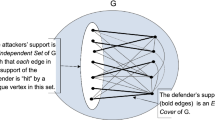Abstract
Game theory typically assumes rational behavior of the players when looking for optimal solutions. Still in case of a mixed equilibrium, it allows players to choose any strategy from the mix in each repetition of the game as long as the optimal frequencies are met in the long run. Which strategy is chosen in a specific round may not be purely random but also depend on what strategy has just been played.
In many cases, playing a particular strategy is tied to cost or efforts. For instance, adding a new defensive strategy (e.g., applying a new virus scanner) requires some investment (implementation cost), but playing the strategy may incur some efforts as well (playing cost: a virus scan takes time and consumes resources, so too frequent scanning appears undesirable). If a security system successfully repels an attack, the attacker is most likely coming back using a different attack vector. Thus we here study repeated games in order to respond to changing attacks.
The effort to play a strategy may be quite dependent on what has been played before, and the switch from the last strategy to the new one, in the next instance (repetition) of the game, may come at what we call a switching cost. These can create an incentive to not play a certain mixed strategy. In cases when there equilibrium is unique, a player may have an incentive to nonetheless deviate from it to save costs, and thus gain more (only in a different way). So, the strategy plan should depend on the equilibrium and the (switching) cost for playing it.
The matter is essentially more complex than only asking for how to play a mixed strategy most efficiently; instead, we need to incorporate the switching costs into the game as an additional goal to be optimized. Those costs are indeed dependent on the equilibrium of the game itself. Thus, the usual dependency of the equilibrium on the payoffs is herein augmented by the converse dependency of the payoffs on the equilibrium. To handle this circular dependency, we will apply a generalized game-theoretic model that allows payoffs to be random variables (rather than real numbers). We show how to solve this new form of game and illustrate the method with an example.
Access this chapter
Tax calculation will be finalised at checkout
Purchases are for personal use only
Similar content being viewed by others
References
Barraclough, D.J., Conroy, M.L., Lee, D.: Prefrontal cortex and decision making in a mixed-strategy game. Nature 7, 404–410 (2004)
Bloomfield, R.: Learning a mixed strategy equilibrium in the laboratory. J. Econ. Behav. Organ. 25(3), 411–436 (1994)
Chiappori, P.-A., Levitt, S., Groseclose, T.: Testing mixed-strategy equilibria when players are heterogeneous: The case of penalty kicks in soccer. Am. Econ. Rev. 92(4), 1138–1151 (2002)
Lozovanu, D., Solomon, D., Zelikovsky, A.: Multiobjective games and determining pareto-nash equilibria. Buletinul Academiei de Stiinte a Republicii Moldova Matematica 3(49), 115–122 (2005)
Maskin, E.: Nash equilibrium and welfare optimality. Rev. Econ. Stud. 66(1), 23 (1999)
Rass, S.: On game-theoretic risk management (part one) - towards a theory of games with payoffs that are probability-distributions. ArXiv e-prints (2015)
Rass, S., Alshawish, A., Abid, M.A., Schauer, S., Zhu, Q., De Meer, H.: Physical intrusion games: optimizing surveillance by simulation and game theory. IEEE Access 5, 8394–8407 (2017)
Rass, S., König, S., Schauer, S.: Decisions with uncertain consequences-a total ordering on loss-distributions. PLoS ONE 11(12), e0168583 (2016). Journal Article
Rass, S., König, S., Schauer, S.: Defending against advanced persistent threats using game-theory. PLoS ONE 12(1), e0168675 (2017). Journal Article
Robinson, J.: An iterative method for solving a game. Ann. Math. 54, 296–301 (1951)
Shaked, M., George Shanthikumar, J.: Stochastic Orders. Springer, New York (2006)
Zhu, Q., Başar, T.: Game-theoretic approach to feedback-driven multi-stage moving target defense. In: Das, S.K., Nita-Rotaru, C., Kantarcioglu, M. (eds.) GameSec 2013. LNCS, vol. 8252, pp. 246–263. Springer, Cham (2013). doi:10.1007/978-3-319-02786-9_15
Acknowledgment
This work is partially supported by the European Commission’s Project No. 608090, HyRiM (Hybrid Risk Management for Utility Networks) under the 7th Framework Programme (FP7-SEC-2013-1).
Author information
Authors and Affiliations
Corresponding author
Editor information
Editors and Affiliations
Rights and permissions
Copyright information
© 2017 Springer International Publishing AG
About this paper
Cite this paper
Rass, S., König, S., Schauer, S. (2017). On the Cost of Game Playing: How to Control the Expenses in Mixed Strategies. In: Rass, S., An, B., Kiekintveld, C., Fang, F., Schauer, S. (eds) Decision and Game Theory for Security. GameSec 2017. Lecture Notes in Computer Science(), vol 10575. Springer, Cham. https://doi.org/10.1007/978-3-319-68711-7_26
Download citation
DOI: https://doi.org/10.1007/978-3-319-68711-7_26
Published:
Publisher Name: Springer, Cham
Print ISBN: 978-3-319-68710-0
Online ISBN: 978-3-319-68711-7
eBook Packages: Computer ScienceComputer Science (R0)




